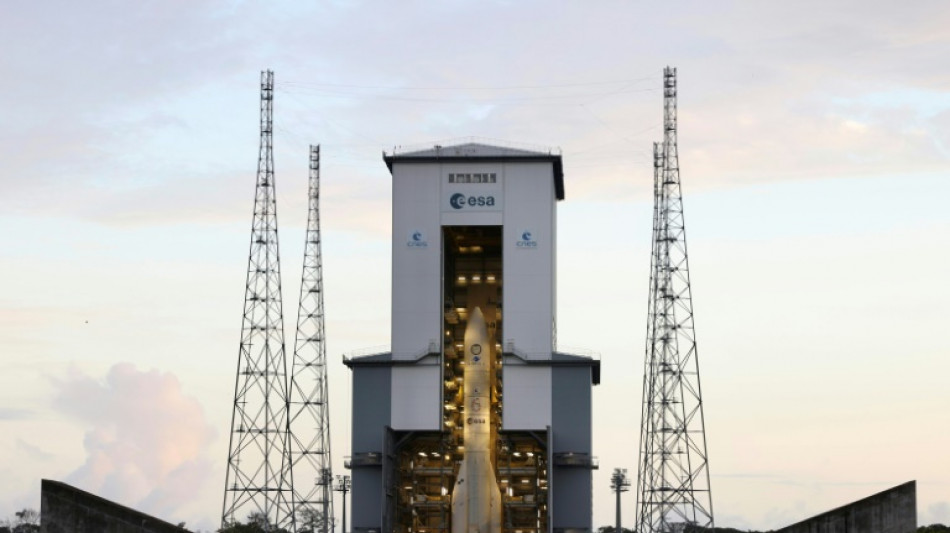
-
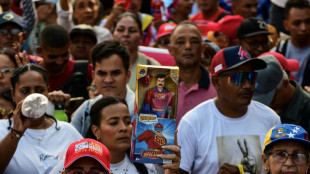 AI reshaping the battle over the narrative of Maduro's US capture
AI reshaping the battle over the narrative of Maduro's US capture
-
Penguins bring forward breeding season as Antarctica warms: study
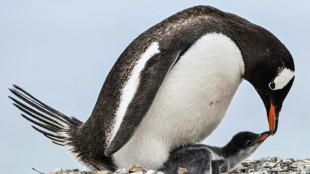
-
 Vietnam leader pledges graft fight as he eyes China-style powers
Vietnam leader pledges graft fight as he eyes China-style powers
-
Ukrainian makes soldier dad's 'dream come true' at Australian Open

-
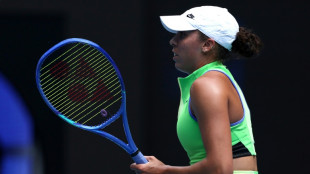 'Timid' Keys makes shaky start to Australian Open title defence
'Timid' Keys makes shaky start to Australian Open title defence
-
Indiana crowned college champions to complete fairytale season

-
 South Koreans go cuckoo for 'Dubai-style' cookies
South Koreans go cuckoo for 'Dubai-style' cookies
-
Harris leads Pistons past Celtics in thriller; Thunder bounce back

-
 Tjen first Indonesian to win at Australian Open in 28 years
Tjen first Indonesian to win at Australian Open in 28 years
-
Long-delayed decision due on Chinese mega-embassy in London

-
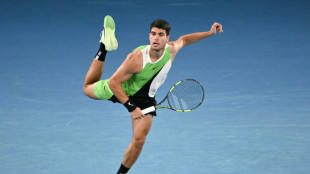 Djokovic jokes that he wants slice of Alcaraz's winnings
Djokovic jokes that he wants slice of Alcaraz's winnings
-
Trump tariff threat 'poison' for Germany's fragile recovery

-
 Tourists hit record in Japan, despite plunge from China
Tourists hit record in Japan, despite plunge from China
-
Jittery Keys opens Melbourne defence as Sinner begins hat-trick quest

-
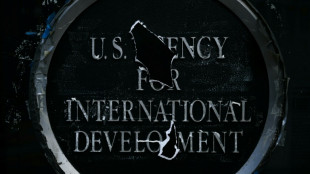 The impact of Trump's foreign aid cuts, one year on
The impact of Trump's foreign aid cuts, one year on
-
Belgian court weighs trial for ex-diplomat over Lumumba killing

-
 Inside China's buzzing AI scene year after DeepSeek shock
Inside China's buzzing AI scene year after DeepSeek shock
-
Asian markets sink, silver hits record as Greenland fears mount
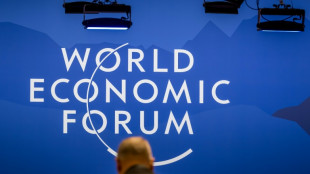
-
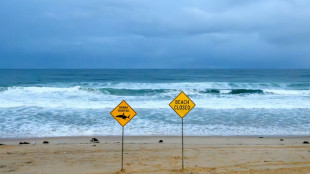 Shark bites surfer in Australian state's fourth attack in 48 hours
Shark bites surfer in Australian state's fourth attack in 48 hours
-
North Korea's Kim sacks vice premier, rails against 'incompetence'
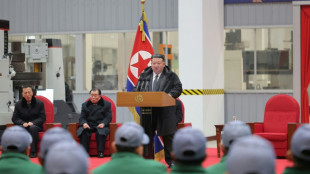
-
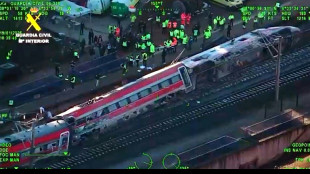 Spain mourns as train crash toll rises to 40
Spain mourns as train crash toll rises to 40
-
'Very nervous' Keys makes shaky start to Australian Open title defence
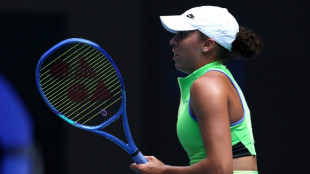
-
 Vietnam leader promises graft fight as he eyes China-style powers
Vietnam leader promises graft fight as he eyes China-style powers
-
Dad-to-be Ruud ready to walk away from Australian Open

-
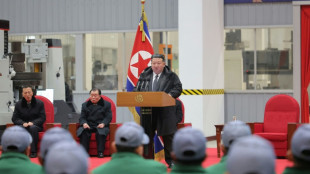 North Korea's Kim sacks senior official, slams 'incompetence'
North Korea's Kim sacks senior official, slams 'incompetence'
-
Farewells, fresh faces at Men's Fashion Week in Paris

-
 'I do not want to reconcile with my family' says Brooklyn Peltz Beckham
'I do not want to reconcile with my family' says Brooklyn Peltz Beckham
-
EU leaders take stage in Davos as Trump rocks global order

-
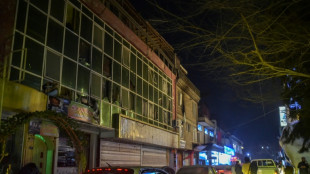 Blast at Chinese restaurant in Kabul kills 7
Blast at Chinese restaurant in Kabul kills 7
-
Warner hits 'Sinners' and 'One Battle' tipped for Oscar nominations

-
 Colombian paramilitary-turned-peace-envoy sentenced over atrocities
Colombian paramilitary-turned-peace-envoy sentenced over atrocities
-
Gilgeous-Alexander leads Thunder in rout of Cavaliers

-
 Seahawks blow as Charbonnet ruled out for rest of season
Seahawks blow as Charbonnet ruled out for rest of season
-
Kostoulas stunner rescues Brighton draw after penalty row

-
 Man Utd greats tell Martinez to 'grow up' as feud rumbles on
Man Utd greats tell Martinez to 'grow up' as feud rumbles on
-
LeBron James' All-Star streak over as starters named

-
 Allies tepid on Trump 'peace board' with $1bn permanent member fee
Allies tepid on Trump 'peace board' with $1bn permanent member fee
-
Ninth policeman dies in Guatemala gang riots, attacks

-
 Man City's Foden to play through pain of broken hand
Man City's Foden to play through pain of broken hand
-
Milan Fashion Week showcases precision in uncertain times

-
 Public media in Europe under unprecedented strain
Public media in Europe under unprecedented strain
-
Africa Cup of Nations refereeing gets a red card

-
 Tributes pour in after death of Italian designer Valentino
Tributes pour in after death of Italian designer Valentino
-
Bills fire coach McDermott after playoff exit: team

-
 Chile wildfires rage for third day, entire towns wiped out
Chile wildfires rage for third day, entire towns wiped out
-
Valentino, Italy's fashion king who pursued beauty at every turn, dies at 93

-
 France PM to force budget into law, concedes 'partial failure'
France PM to force budget into law, concedes 'partial failure'
-
Allies tepid on Trump 'peace board' with $1bln permanent member fee

-
 'My soul is aching,' says Diaz after AFCON penalty miss
'My soul is aching,' says Diaz after AFCON penalty miss
-
Ex-OPEC president in UK court ahead of corruption trial


Europe's new Ariane 6 rocket blasts off for first time
Europe's new Ariane 6 rocket blasted off for the first time smoothly on Tuesday, carrying with it the continent's hopes of regaining independent access to space.
The much-delayed inaugural flight of the European Space Agency's most powerful rocket yet launched from Europe's spaceport in Kourou, French Guiana at 4pm local time (1900 GMT).
Crews on the ground at the launch site, which is surrounded by jungle on the South American coast, applauded as the rocket soared into clear skies.
Ariane 6's first launch, which was originally planned for 2020, is hoped to bring an end to a difficult time for European space efforts.
Since the last flight of its workhorse predecessor, Ariane 5, a year ago, Europe has been unable to launch satellites or other missions into space without relying on rivals such as Elon Musk's US firm SpaceX.
ESA chief Josef Aschbacher said it was a "very important moment for Europe".
"We are re-establishing independent access to space for Europe," he said just before the launch.
- 'First sigh of relief' -
Earlier Tuesday, the giant metal structure housing the rocket was rolled away, unsheathing the 56-metre (183 feet) behemoth in light rain, an AFP journalist observed.
After a positive weather report, the rocket's tanks were filled with liquid hydrogen and liquid oxygen.
The planned time for liftoff was delayed by an hour after routine checks revealed a small data issue that was resolved, according to the ESA.
Tony dos Santos, Kourou technical manager, said that teams on the ground would only be able to "breathe our first sigh of relief when the first satellites have been released".
That is expected an hour and six minutes after liftoff. The entire flight is scheduled to take nearly three hours.
The mission will be considered successfully complete when the rocket's reusable upper stage splashes down into the Pacific Ocean.
In Kourou, more than 200 experts were concealed in a bunker near the launch site, checking for any potential problems before liftoff.
They were in constant contact with the Jupiter control room, the communications hub between the teams -- and data sent from the rocket.
A large number of armed forces also watched over the launch, including three fighter jets deployed to deter any curious aircraft nearby.
Successful inaugural flights are by no means guaranteed. Historically, nearly half of the first launches of new rockets have ended in failure. That includes Ariane 5, which exploded moments after liftoff in 1996.
But out of 117 launches over nearly 20 years, only one other Ariane 5 flight completely failed.
- Europe's 'return' -
Space has become big business and competition is soaring, particularly from SpaceX's fully re-usable Falcon 9 rockets.
Yet in recent years Europe has found itself without an independent way to give lucrative satellites a ride into space.
Russia pulled its Soyuz rockets, long used for European launches at Kourou, after Moscow invaded Ukraine in 2022.
Later that year, Europe's Vega-C light launcher was grounded after a launch failure. Ariane 6 delays compounded the crisis.
Tuesday's launch will mark Europe's "return" to the space scene, ESA space transportation director Toni Tolker-Nielsen said.
Selected by the ESA back in 2014, Ariane 6 will able to place satellites in geostationary orbit 36,000 kilometres above Earth, as well as satellite constellations a few hundreds of kilometres up.
The rocket's maiden flight will carry 17 different "passengers", including 11 university micro-satellites, as well as re-entry capsules and small scientific experiments.
One more Ariane 6 launch is scheduled for this year, followed by six in 2025 then eight in 2026.
In the future, it is booked to launch some of Amazon's Kuiper constellation of internet satellites.
T.Zimmermann--VB



